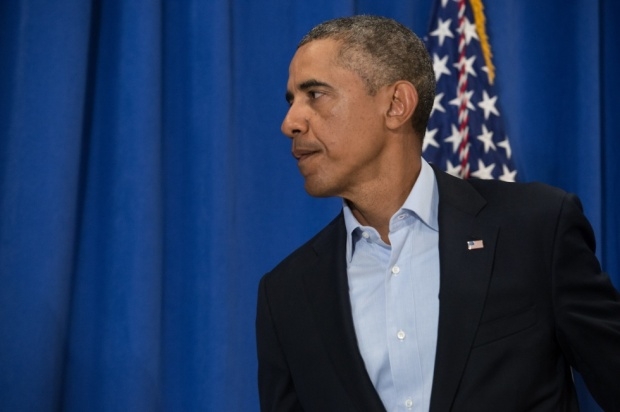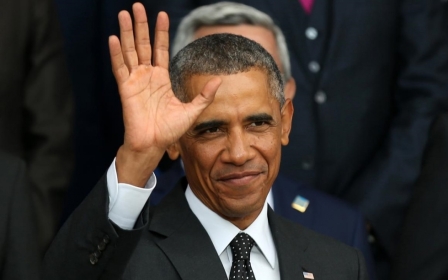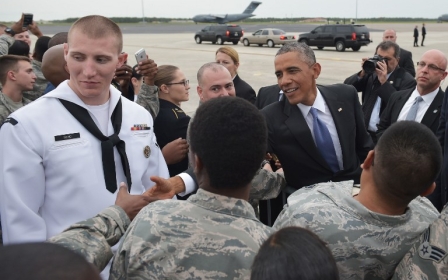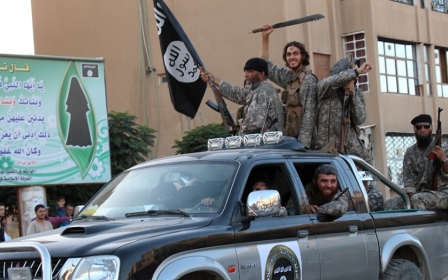Obama says US not alone in fighting IS

President Barack Obama said Tuesday that air strikes the United States and its Arab allies unleashed against the Islamic State (IS) group in Syria showed that America is not alone in confronting the militants.
Dozens of IS and Al-Qaeda militants were reported killed in the raids, which Washington said had partly targeted militants plotting an "imminent attack" against the West.
Bahrain, Jordan, Qatar, Saudi Arabia and the United Arab Emirates joined the operation, which involved fighter jets, bombers, drones and Tomahawk missiles fired from US warships.
US and French forces have already been carrying out air strikes in neighbouring Iraq.
Tuesday's raids mark a turning point in the war against IS, which has seized swathes of Syria and Iraq.
Obama said "the strength of this coalition makes it clear to the world that this is not America's fight alone.
"It must be clear to anyone who would plot against America and try to do Americans harm that we will not tolerate safe havens for terrorists who threaten our people," he added.
Describing the strikes as "very successful," the Pentagon said they hit IS positions, training compounds, command centres and armed vehicles in the group's stronghold of Raqa and near the Iraqi border.
Turkey to 'join coalition'
NATO member Turkey has so far remained on the sidelines, but US Secretary of State John Kerry said Ankara had pledged to join the coalition.
"Turkey is very much part of this coalition, and Turkey will be very engaged on the frontlines of this effort," Kerry said after meeting Turkish officials in New York.
Speaking on national television, Turkish President Recep Tayyip Erdogan said Ankara's contribution would consist of "all kinds of support including military and political".
Washington had been reluctant to intervene in Syria's civil war, but was jolted into action as IS captured more territory.
The United States said it had not requested Syria's permission for the strikes or given advance notice "at a military level".
Even so, President Bashar al-Assad said Damascus supported any international effort "to fight against terrorism".
The United Nations says about 191,000 people have been killed since an uprising against Assad erupted in 2011, escalating into a war that brought militants streaming into Syria.
'Huge impact'
An anti-Assad activist in Raqa, Abu Yusef, said IS had redeployed its fighters in response.
"The impact of the strikes has been huge," and the militants "are focused on trying to save themselves now," he told AFP by Internet.
The raids prompted many civilians living near IS positions to flee, according to the Syrian Observatory for Human Rights, a Britain-based monitoring group.
Washington said it launched 14 strikes against IS targets around the militant stronghold of Raqa, as well as in Deir Ezzor, Albu Kamal and Hasakeh on the border with Iraq.
The raids were believed to have killed a group of Al-Qaeda "veterans" -- known as Khorasan -- plotting to attack the United States and Western interests, the Pentagon said.
The strikes targeted their training camps, an explosives and munitions production site, a communication building and a command and control centre, it said.
The Observatory said at least 50 Al-Qaeda militants were killed, as well as more than 70 IS members. Eight civilians, including three children, were also among the dead.
31,000 IS fighters
The CIA says IS has up to 31,000 fighters, and EU counter-terrorism chief Gilles de Kerchove told AFP Tuesday the number of Europeans joining Islamist fighters in Syria and Iraq has surged to about 3,000 from 2,000 only months ago.
Air strikes were also conducted in Iraq, the Pentagon said, bringing the total number of US raids there to 194.
Washington has said the goal of the strikes is to weaken IS so it can be taken on by ground forces including the Iraqi army and moderate Syrian rebels, who are to be trained and equipped by the coalition.
Syria's opposition National Coalition welcomed the new raids, but urged sustained pressure on Assad's government.
But the Hazm Movement, a rebel group that has reportedly received weapons from the United States, criticised the raids, saying they would benefit Assad.
"The sole beneficiary of this foreign interference in Syria is the Assad regime, especially in the absence of any real strategy to topple him," it tweeted.
And Assad ally Iran also condemned the strikes, calling them a violation of Syrian sovereignty.
Hezbollah chief criticises US-led strikes in Syria
Meanwhile, Hassan Nasrallah, chief of Lebanon's powerful Shiite Hezbollah movement, criticised the US-led strikes on Tuesday, saying he would not back a coalition that served "American interests".
"We have a principle: whether the Americans attack the Islamic State, the Taliban or the former Iraqi regime, we oppose US military intervention, and we are against an international coalition in Syria," he said in a televised address.
"Our position does not change... we refuse all American military intervention, whether its under international cover or that of NATO," he added.
"This coalition, as (US President Barack) Obama said in all his speeches, is intended to defend American interests," Nasrallah said.
"It was only when this danger started to threaten their interests" that Washington responded, he added.
Nasrallah, whose speech was broadcast by Hezbollah's Al-Manar TV, said Lebanon should not be part of the anti-IS coalition, though Beirut signed up to the grouping at a meeting this month in Saudi Arabia.
Hezbollah is a key ally of Syria's -Assad and has dispatched fighters to bolster his forces, following a pro-democracy uprising that began in 2011 but later turned into a civil war.
Nasrallah has defended the group's intervention in Syria by saying it is fighting there to prevent militants from entering Lebanon, though the conflict has regularly spilled over into Syria's smaller neighbour.
New MEE newsletter: Jerusalem Dispatch
Sign up to get the latest insights and analysis on Israel-Palestine, alongside Turkey Unpacked and other MEE newsletters
Middle East Eye delivers independent and unrivalled coverage and analysis of the Middle East, North Africa and beyond. To learn more about republishing this content and the associated fees, please fill out this form. More about MEE can be found here.




